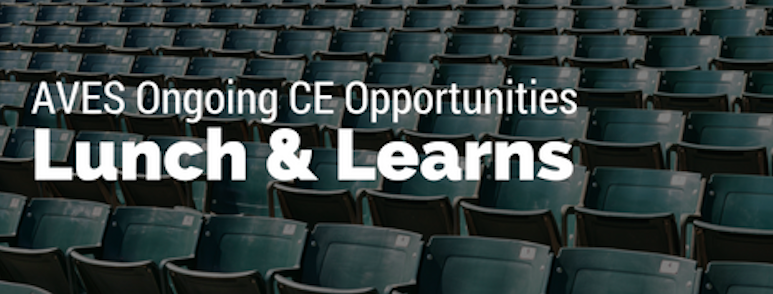Veterinary Continuing Education Austin Sept 30 2018
AVES Continuing Education Lunch and Learns

As part of our ongoing commitment to veterinary continuing education and research, AVES offers the opportunity for our community of veterinary practices to schedule Continuing Education Lunch and Learns.
How does it work?
Interested in scheduling a Lunch and Learn? Interested in scheduling a Lunch and Learn? Simply contact portal@austinvets.com. Please include your interested lecture(s), a couple of date options (please allow 30 days lead time), and any other information you'd like to discuss regarding Lunch and Learns. We'll take it from there! We will work with your veterinarians', technicians', and any other interested staff's schedules to coordinate the best date for one of our specialists to come lecture on a topic of your choice. We receive TBVME approval for each hour-long lecture. AVES will even bring lunch for the participants!
Here are several of our current CE Lunch and Learn topics:
- The Neurologic Examination
Tracy Sutton, DVM, DACVIM (Neurology) | Neurology & Neurosurgery
The neurological examination will be reviewed in two parts. The first part will focus on demonstration of how to perform an examination with a volunteer dog. The second part will focus on the integration of findings on the neurologic examination to formulate neurolocalization.
- Cardiopulmonary Resuscitation – Review of Updated Guidelines
Lindsay Vaughn, DVM, DACVECC | Emergency & Critical Care
This lecture will review the new RECOVER CPR guidelines created by the American College of Veterinary Emergency and Critical Care. Dr. Vaughn will spend the hour reviewing the 5 main domains of the RECOVER guidelines: Preparedness and Prevention, Basic Life Support, Advanced Life Support, Monitoring, and Post-Cardiac Arrest Care. You will leave the lecture with a basic understanding of CPR and the confidence to perform CPR in your own clinic.
- Chemotherapy Side Effects and Safety
Timothy Stein, DVM, PhD, DACVIM | Oncology
Stein will be presenting a lecture on commonly encountered side effects of chemotherapy in veterinary medicine and how these side effects may be managed via outpatient or inpatient basis. He will provide information regarding chemotherapy safety in the workplace, and attendees will have a better understanding and awareness of how to handle chemotherapy, chemotherapy waste and patients that have received chemotherapy.
- A Review of Urinary Defenses, UTI Management, and Urinary Antiseptics
Maura Duffy, DVM, DACVIM | Internal Medicine
In this lecture, Dr. Duffy will review the normal bladder and lower urinary defenses. She will then review management of complicated urinary tract infections and discuss some of the rationale and treatment options for urinary antiseptics to prevent re-infections.
- Top 3 Pelvic Limb Orthopedic Surgeries for the General Practitioner
Russell Kalis, DVM, DACVS | Surgery & Orthopedics
This hour-long presentation will include radiographic and intra-operative images (pictures and videos) demonstrating proper techniques for routine patella luxation corrective osteotomies, FHNO, and extracapsular lateral suture stifle stabilization procedures. The aim of this presentation is to provide simple and accurate techniques for the most predicative and successful clinical outcomes.
- Snake Envenomation in Small Animals
Lindsay Vaughn, DVM, DACVECC | Emergency & Critical Care
Snake envenomation can cause significant morbidity in veterinary patients and can unfortunately result in mortality if left untreated. This one hour lecture will review the pathophysiology and both local and systemic complications associated with snake envenomation. Both monitoring and treatment recommendations will be reviewed based on the most current veterinary literature associated with snake envenomation.
- One Neurologist's Approach to the Seizure Patient
Tracy Sutton, DVM, DACVIM (Neurology) | Neurology & Neurosurgery
The This lecture will provide a step wise overview of initial management of a potential seizure patient including the initial consultation, antiepileptic medication options and decision making strategies with the goal of developing a foundation from which the veterinarian can build their own management approach.
- GDV and Gastropexy
Russell Kalis, DVM, DACVS | Surgery & Orthopedics
The purpose of this one hour lecture is to review treatment and preventions of gastric dilatation and volvulus, while focusing on preventative gastropexy techniques. In addition, minimally invasive techniques will be reviewed, including laparoscopic-assisted and total laparoscopic gastropexy techniques.
- Veterinary Anesthesia and Monitoring
Lindsay Vaughn, DVM, DACVECC | Emergency & Critical Care
This lecture is intended for veterinary technicians and was created after consulting numerous anesthesiologists and reviewing current literature including the AAHA Anesthesia Guidelines and ACV-Anesthesia Monitoring Guidelines. The lecture will review: pre-anesthetic evaluation, pre-induction preparation, anesthesia induction, anesthesia monitoring, and post-anesthesia recovery. Five case scenarios that will be discussed as a group to ensure that the necessary information was relayed to the audience. The veterinary technicians will be provided with cognitive aides including anesthesia planning charts, emergency drug sheets, and anesthesia monitoring logs.
If you would like to be emailed about additional CE opportunities from AVES, please click here to sign up for our CE Opportunities mailing list.
- Author
- Recent Posts
![]()
AVES 2022-02-08T15:12:13-06:00
Source: https://austinvets.com/aves-continuing-education-lunch-and-learns/
0 Response to "Veterinary Continuing Education Austin Sept 30 2018"
إرسال تعليق